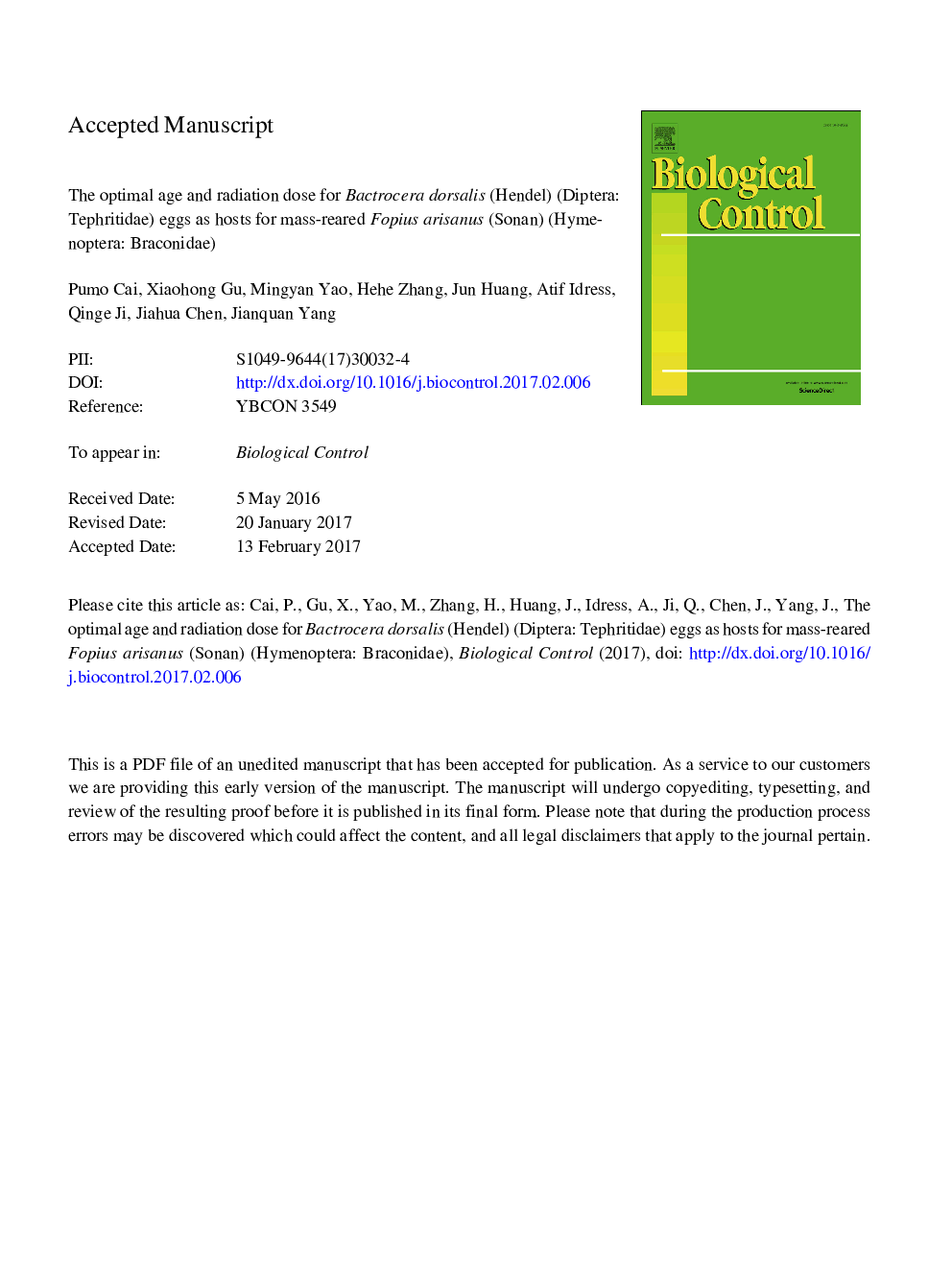| کد مقاله | کد نشریه | سال انتشار | مقاله انگلیسی | نسخه تمام متن |
|---|---|---|---|---|
| 5760757 | 1624226 | 2017 | 37 صفحه PDF | دانلود رایگان |
عنوان انگلیسی مقاله ISI
The optimal age and radiation dose for Bactrocera dorsalis (Hendel) (Diptera: Tephritidae) eggs as hosts for mass-reared Fopius arisanus (Sonan) (Hymenoptera: Braconidae)
دانلود مقاله + سفارش ترجمه
دانلود مقاله ISI انگلیسی
رایگان برای ایرانیان
موضوعات مرتبط
علوم زیستی و بیوفناوری
علوم کشاورزی و بیولوژیک
علوم زراعت و اصلاح نباتات
پیش نمایش صفحه اول مقاله

چکیده انگلیسی
Fopius arisanus (Sonan) is a dominant egg-pupal parasitoid of many fruit fly pests. Bactrocera dorsalis (Hendel) is one of F. arisanus' hosts and is the usual host used for mass rearing F. arisanus. To obtain parasitoids without hosts suitable for the release of F. arisanus in the field-skipping the need to separate parasitoids and unparasitized hosts-radiation (15, 20, 25 and 30Â Gy) was applied to B. dorsalis eggs of five different ages (24, 27, 30, 33, and 36Â h). Hatch rates, pupation rates, pupae weights, emergence rates, sex ratios, flight abilities, mortality rates and fertilities were analyzed during parasitoid development from irradiated eggs to adults. Irradiation of eggs aged 30-36Â h at 20Â Gy might be the optimal age and dosage when using B. dorsalis as hosts for mass rearing of F. arisanus. Furthermore, we investigated the viability of the parents and offspring of F. arisanus when the parents were raised from irradiated eggs under both laboratory and field cage conditions. The parasitism percentage, emergence rate, sex ratio (female: male) and longevity of parasitoids reared with irradiated hosts were similar to those of parasitoids obtained from non-irradiated host eggs. Significantly, the results revealed that unparasitized B. dorsalis previously irradiated with an appropriate dose at appropriate ages do not emerge: a finding that solves the problem of separating unparasitized emerging flies during mass rearing. This experiment also demonstrates that F. arisanus reared on irradiated hosts can find, identify, and parasitize hosts normally-both indoors and outdoors-and that the resulting parasitoids can be directly applied to control pest populations in the field.
ناشر
Database: Elsevier - ScienceDirect (ساینس دایرکت)
Journal: Biological Control - Volume 108, May 2017, Pages 89-97
Journal: Biological Control - Volume 108, May 2017, Pages 89-97
نویسندگان
Pumo Cai, Xiaohong Gu, Mingyan Yao, Hehe Zhang, Jun Huang, Atif Idress, Qinge Ji, Jiahua Chen, Jianquan Yang,